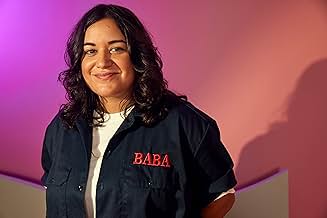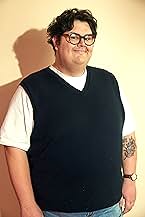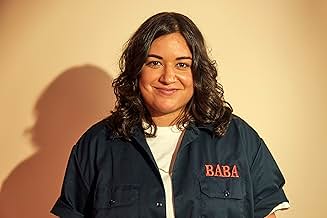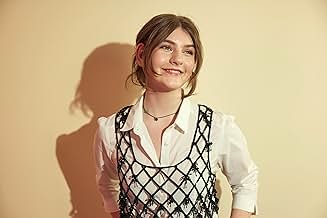IMDb RATING
6.4/10
4.2K
YOUR RATING
Sam, a stand-up comedian struggling with PTSD, weighs whether or not to join the search for a missing teenage girl she used to nanny.Sam, a stand-up comedian struggling with PTSD, weighs whether or not to join the search for a missing teenage girl she used to nanny.Sam, a stand-up comedian struggling with PTSD, weighs whether or not to join the search for a missing teenage girl she used to nanny.
- Awards
- 8 nominations total
- Director
- Writer
- All cast & crew
- Production, box office & more at IMDbPro
Featured reviews
Ally Pankiw's feature debut "I Used to be Funny" competently explores fragile experiences of depression and PSTD, recovering from assault, and child endangerment with a tame dose of fragile drama, sprinkled with witty humour.
Pankiw's choice to present the story through sequencing between Sam's mission to find a missing Brooke, the young girl she nannied, and frequent flashbacks of memories of the two's once-close bond. While the concept of a non-linear narrative is meant to efficiently expand the dynamics and pasts of the characters and their journeys, which it technically achieves for the majority of the film. The beginning of this sequence felt static as the vague nature that shrouded the connection between Sam, her trauma, and her past with Brooke, overstayed its welcome in the first third of the story. However, the pace thankfully accelerates once the first clues of Brooke's disappearance are uncovered.
Some elements of the film at times, lean too hard into melodrama that lacks actual substance, especially in the vague and unmoving first third of the film. Cuts to some flashbacks that felt somewhat cliche a script that at times felt too expository, and perhaps two-too-many Phoebe Bridgers needle drops; tools that ask the audience to engage with the characters and the mysterious tragedy that haunts them. These elements may have been appropriate in the context of a television episode, considering Pankiw's background in TV direction, but unfortunately fell flat within a full-length feature film.
Amidst these faults, one of the film's greatest strengths is its talented cast. Rachel Sennott's has not only cemented herself as a star of off-beat and relatable comedy but also demonstrated a striking capacity for performances filled with intense vulnerability, harmoniously embodying all relevant elements of the tragicomedy genre. Her ability to foster chemistry with the rest of the cast only adds further dimension to the sorrow and humor that defines her character's journey.
Overall, I Used to Be Funny poses an intimate image of how trauma can take control of our lives and sense of self-worth. While bleak, the potential for healing is also presented as the empathetic and hopeful conclusion to Sam and Brooke's journey. While the film's approach at times lacks the ingenuity and impact it clearly intended to bring, it remains that Pankiw's strength lies in how she stays firm with the difficult themes and issues she addresses.
Pankiw's choice to present the story through sequencing between Sam's mission to find a missing Brooke, the young girl she nannied, and frequent flashbacks of memories of the two's once-close bond. While the concept of a non-linear narrative is meant to efficiently expand the dynamics and pasts of the characters and their journeys, which it technically achieves for the majority of the film. The beginning of this sequence felt static as the vague nature that shrouded the connection between Sam, her trauma, and her past with Brooke, overstayed its welcome in the first third of the story. However, the pace thankfully accelerates once the first clues of Brooke's disappearance are uncovered.
Some elements of the film at times, lean too hard into melodrama that lacks actual substance, especially in the vague and unmoving first third of the film. Cuts to some flashbacks that felt somewhat cliche a script that at times felt too expository, and perhaps two-too-many Phoebe Bridgers needle drops; tools that ask the audience to engage with the characters and the mysterious tragedy that haunts them. These elements may have been appropriate in the context of a television episode, considering Pankiw's background in TV direction, but unfortunately fell flat within a full-length feature film.
Amidst these faults, one of the film's greatest strengths is its talented cast. Rachel Sennott's has not only cemented herself as a star of off-beat and relatable comedy but also demonstrated a striking capacity for performances filled with intense vulnerability, harmoniously embodying all relevant elements of the tragicomedy genre. Her ability to foster chemistry with the rest of the cast only adds further dimension to the sorrow and humor that defines her character's journey.
Overall, I Used to Be Funny poses an intimate image of how trauma can take control of our lives and sense of self-worth. While bleak, the potential for healing is also presented as the empathetic and hopeful conclusion to Sam and Brooke's journey. While the film's approach at times lacks the ingenuity and impact it clearly intended to bring, it remains that Pankiw's strength lies in how she stays firm with the difficult themes and issues she addresses.
As a person who has also experienced trauma, I've often wondered - how would I ever approach writing a book or movie about my experiences, and honestly the way this movie used flashbacks did resonate with me.
I can understand how some might feel it's disjointed, but honestly that's sometimes how living with PTSD, depression, etc. Feels like.
I know some people complained that it's not funny, I guess I didn't expect it to be laugh out loud funny based on the description - it literally includes PTSD in the description and is called "I used to be funny" - i.e. She doesn't feel funny anymore.
Overall, I appreciated the storytelling.
I can understand how some might feel it's disjointed, but honestly that's sometimes how living with PTSD, depression, etc. Feels like.
I know some people complained that it's not funny, I guess I didn't expect it to be laugh out loud funny based on the description - it literally includes PTSD in the description and is called "I used to be funny" - i.e. She doesn't feel funny anymore.
Overall, I appreciated the storytelling.
Sam Cowell (Rachel Sennott) is a stand-up comic with some success who does a bit of work as a nanny. Her 14 year old former charge Brooke Renner (Olga Petsa) is declared missing and shows up smashing her door in anger. Two years earlier, Sam gets hired by Cameron Renner (Jason Jones) to watch his 12 year old daughter while his wife is sick in the hospital.
The first half is intriguing. The mystery of the incident keeps my interest. Once it's revealed, the movie goes into Lifetime territories. The one glaring problem is the aunt's presence. Sam would notify her at every step. The fact that she exists is an exit ramp for Sam to take. That diminishes the intensity of the story. If she doesn't exist, Brooke would be running away from a foster home. The police could be less than co-operative. Then Sam would feel like she's Brooke's only hope. That would raise the intensity of the second half. As for Olga Petsa, she's a little old to play a 12 year old. Brooke's young age is very important to her feelings. Otherwise, Sennott is excellent. I can see this story working, but it needs some changes.
The first half is intriguing. The mystery of the incident keeps my interest. Once it's revealed, the movie goes into Lifetime territories. The one glaring problem is the aunt's presence. Sam would notify her at every step. The fact that she exists is an exit ramp for Sam to take. That diminishes the intensity of the story. If she doesn't exist, Brooke would be running away from a foster home. The police could be less than co-operative. Then Sam would feel like she's Brooke's only hope. That would raise the intensity of the second half. As for Olga Petsa, she's a little old to play a 12 year old. Brooke's young age is very important to her feelings. Otherwise, Sennott is excellent. I can see this story working, but it needs some changes.
I think the movie 'Funny People' gave me PTSD for movies about comedians. I didn't enjoy that movie much at all and I think I was worried I was going to have a similar experience with 'I Used to be Funny'. That couldn't have been further from the case though. I was glued to the screen for every minute of this film.
Rachel Sennott has been one of the most interesting actresses to watch in recent years, but this film gave her the chance to prove she can truly act in a dramatic role. And she killed it. Also I had never heard of Caleb Hearon until this week and yet now I've seen him steal the show in two films. He has a lot of charm that man.
This is a heavy film. It's gritty and raw and quite devastating at times. I loved the structure of the film, with the intersecting timelines and the mystery around what exactly happened. I will say you have to have your wits about you at times to keep on track of which timeline you are actually in.
I really enjoyed this film. I'm quite surprised to be honest to see it with only a 6.3/10 on IMDb. I feel like I must've seen something in it that others didn't. I highly recommend this one though. 9/10.
Rachel Sennott has been one of the most interesting actresses to watch in recent years, but this film gave her the chance to prove she can truly act in a dramatic role. And she killed it. Also I had never heard of Caleb Hearon until this week and yet now I've seen him steal the show in two films. He has a lot of charm that man.
This is a heavy film. It's gritty and raw and quite devastating at times. I loved the structure of the film, with the intersecting timelines and the mystery around what exactly happened. I will say you have to have your wits about you at times to keep on track of which timeline you are actually in.
I really enjoyed this film. I'm quite surprised to be honest to see it with only a 6.3/10 on IMDb. I feel like I must've seen something in it that others didn't. I highly recommend this one though. 9/10.
"I Used to Be Funny" is a captivating Canadian film that masterfully weaves together raw, heartbreaking moments with a surprising touch of humor. Rachel Sennott's performance shines yet again, reaffirming my unwavering admiration for her talent. As both the lead and a true force on screen, Sennott's portrayal effortlessly captures the complexities of the character's journey.
Ally Pankiw's directorial debut is stellar, showcasing a deep understanding of the human experience. While not flawless, the film's imperfections only add to its authenticity. Pankiw's skillful storytelling draws viewers into the protagonist's world, offering an accurate depiction of life with PTSD. The film's ability to blend these elements in a way that's both poignant and relatable makes it a must-see for anyone seeking a moving cinematic experience.
Ally Pankiw's directorial debut is stellar, showcasing a deep understanding of the human experience. While not flawless, the film's imperfections only add to its authenticity. Pankiw's skillful storytelling draws viewers into the protagonist's world, offering an accurate depiction of life with PTSD. The film's ability to blend these elements in a way that's both poignant and relatable makes it a must-see for anyone seeking a moving cinematic experience.
Did you know
- TriviaDirector Ally Pankiw was dating Muna member Naomi McPherson during the production of the film, but have since broken up. Naomi is still second to the top of special thanks during credits, and two Muna songs feature during the film.
- How long is I Used to Be Funny?Powered by Alexa
Details
- Release date
- Countries of origin
- Language
- Also known as
- I Used to Be Funny
- Production companies
- See more company credits at IMDbPro
Box office
- Gross US & Canada
- $171,756
- Opening weekend US & Canada
- $29,499
- Jun 9, 2024
- Gross worldwide
- $171,756
- Runtime
- 1h 45m(105 min)
- Color
- Aspect ratio
- 2.00 : 1
Contribute to this page
Suggest an edit or add missing content







































